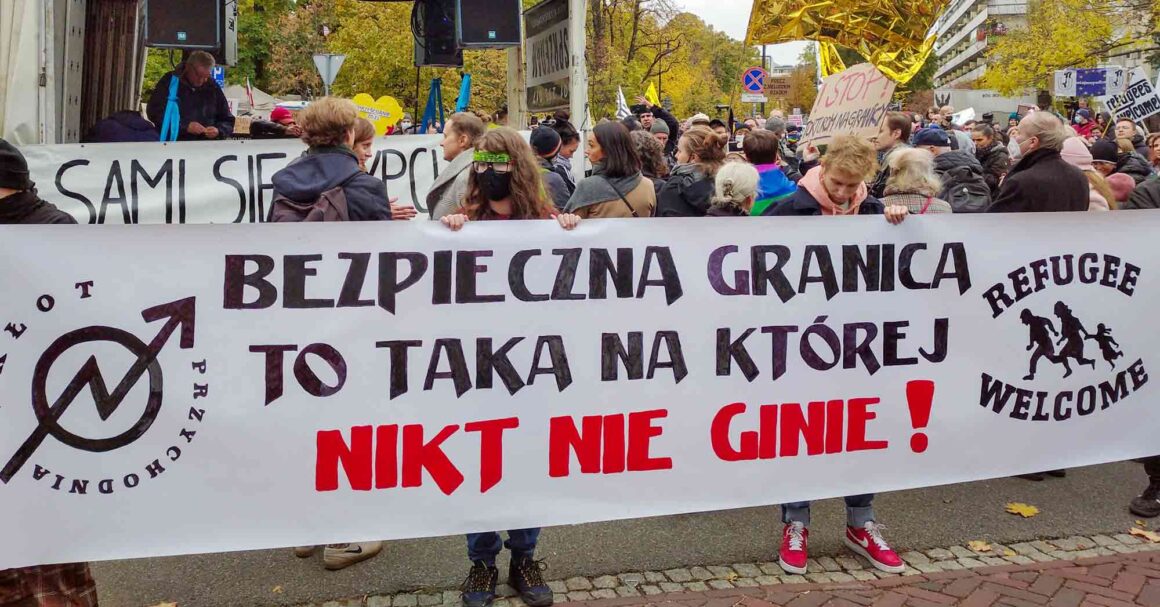

Photo: Rally held in Warsaw in solidarity with migrants who have been pushed back at Poland’s border with Belarus – 17 October. Banner reads “A safe border is one where no one is killed”. Credit Tomasz Molina.
By Urte March
The horrific scenes of families, including young children, starving and freezing on the Belarusian border represent a new low for human rights in the recent history of Europe. The EU, fully backed by Britain and the US, and Belarus, equally supported by Russia, are both to blame for this deadly standoff.
The Guardian reports that 13 people have been confirmed dead on the border, including a one-year-old Syrian child whose family had reportedly been living in the forest for a month. Meanwhile, border patrol teams are withholding humanitarian aid from migrants and removing them – often violently – back to Belarus, in a blatant breach of the international right to claim asylum.
The British government is now directly complicit in this violence. Up to 140 soldiers from the Royal Engineers have been sent to help physically reinforce the Polish border.
The military escalation in Poland is one part of a wider military build-up along Europe’s eastern frontier. Poland has so far refused to accept help from Frontex, the EU’s own border agency, preferring to declare a state of emergency and reach a wider military agreement with its neighbours.
Warsaw is also negotiating a £3 billion arms deal with British companies for missiles and air defence systems intended to counter Russia. In late November it was announced that the UK would provide £1.7 billion in loans to Ukraine to boost its military capacity in the Black Sea (the loan will be used to buy British-made ships).
Meanwhile Russia has concentrated around 90,000 troops along with tanks and artillery in Crimea and near the separatist-held Donbas. Western intelligence analysts are scaremongering about a possible Russian invasion of Ukraine.
The President of Belarus, Alexander Lukashenko, hopes that the manufactured crisis will force EU leaders into a dialogue around the sanctions it has placed on Belarus These hopes may not be entirely misplaced. A Belarusian press spokesperson claimed that Lukashenko and Angela Merkel had discussed a special scheme to bring some of the migrants to Germany, in exchange for Belarusian agreement to repatriate the majority of those still on its side of the border.
In November, Belarusian state forces broke up a camp near Kuźnica, moving many of the migrants to a warehouse nearby. Belarus is now also supporting the repatriation of migrants who, realising they have been used as cannon fodder, now wish to return to their countries of origin. All this may be a demonstration of good faith ahead of hoped-for further concessions from the EU.
But it is hard to imagine agreement between EU nations on significant concessions to Belarus or allowing in more refugees. Right wing populist parties are either in government or ascendant in many European countries. Reports of a call between Merkel and Lukashenko drew consternation from the Polish government. EU officials have framed the conflict not as a ‘humanitarian crisis’ but as an ‘attempt of an authoritarian regime to try to destabilise its democratic neighbours’ and have taken a hard line in attempts to deter the crossings.
The ‘crisis’ exposes the contradiction at the heart of the EU and the inability of the capitalist world order to solve the problem of increasing mass migration due to poverty, wars and climate change. Although the EU is nominally committed to human rights and an EU-wide approach to managing migration in accordance with international law, in reality it is a group of self-interested nations.
There is gross hypocrisy and racism at play too – last year Lithuania handed out hundreds of special humanitarian visas to Belarusian political dissidents fleeing Lukashenko’s regime; meanwhile almost none of the migrants from the Middle East have been granted asylum.
The crisis once again shows how the claim that EU institutions are somehow intrinsically more progressive than the authoritarian East is a naïve falsehood. The left and labour movement across Europe have one great advantage – freedom of movement – which it must use to organise a mass international solidarity movement to open up safe, legal routes for refugees and migrants, regardless of their ability to ‘prove’ their status.